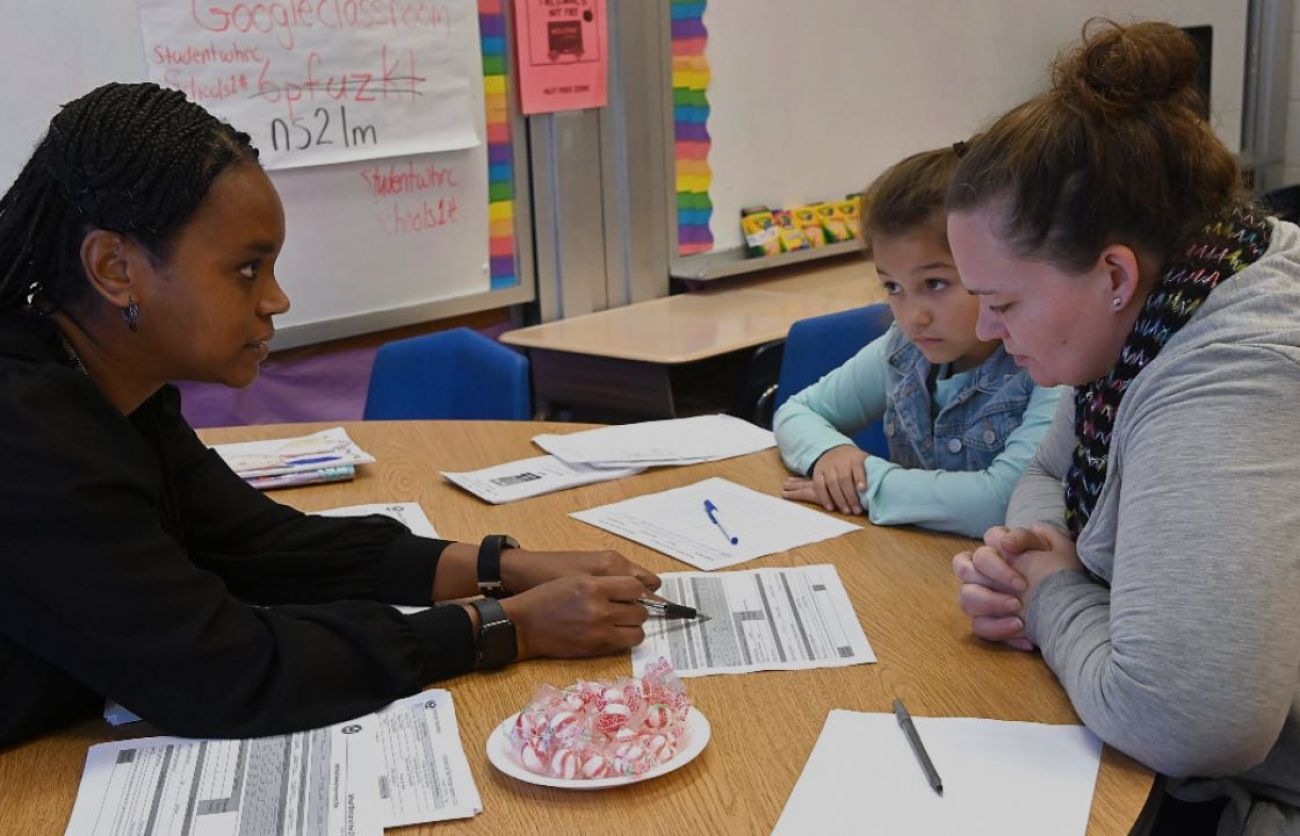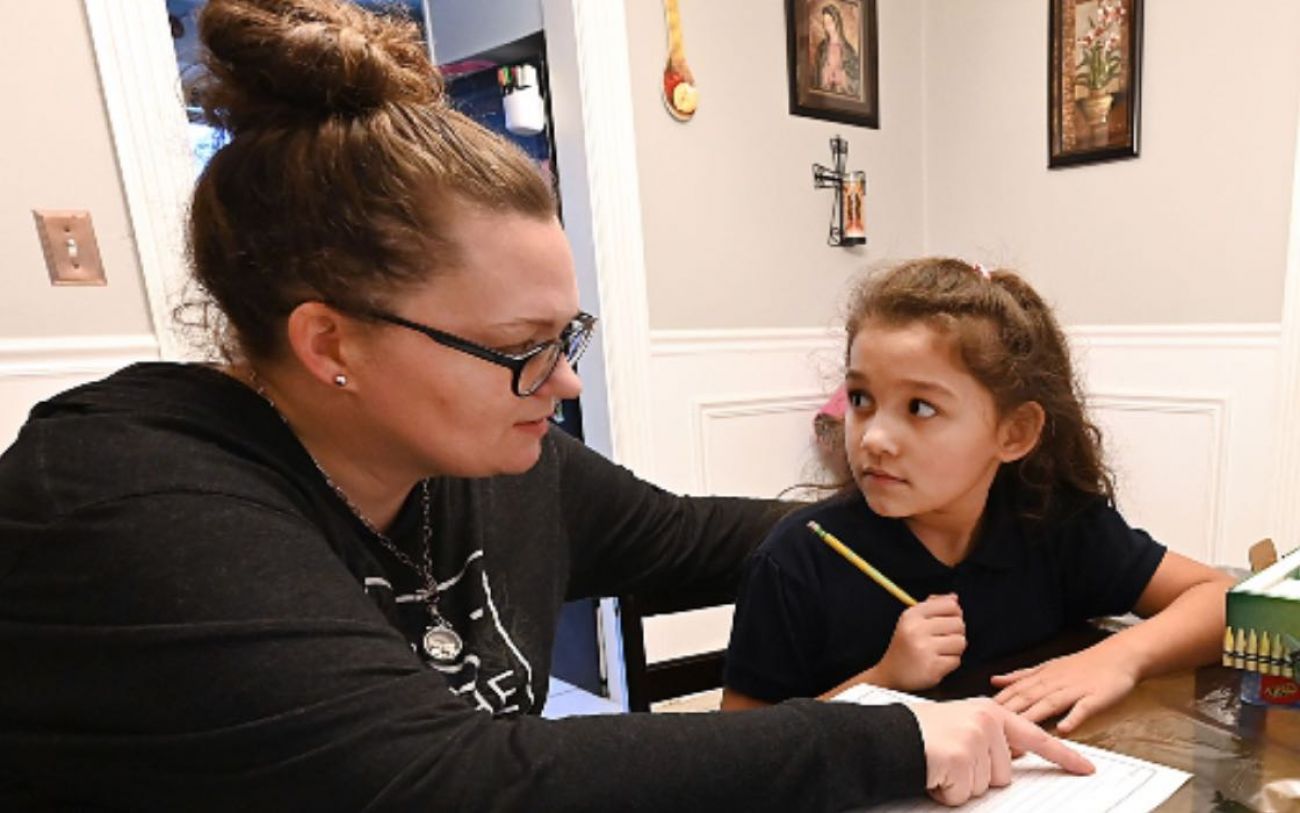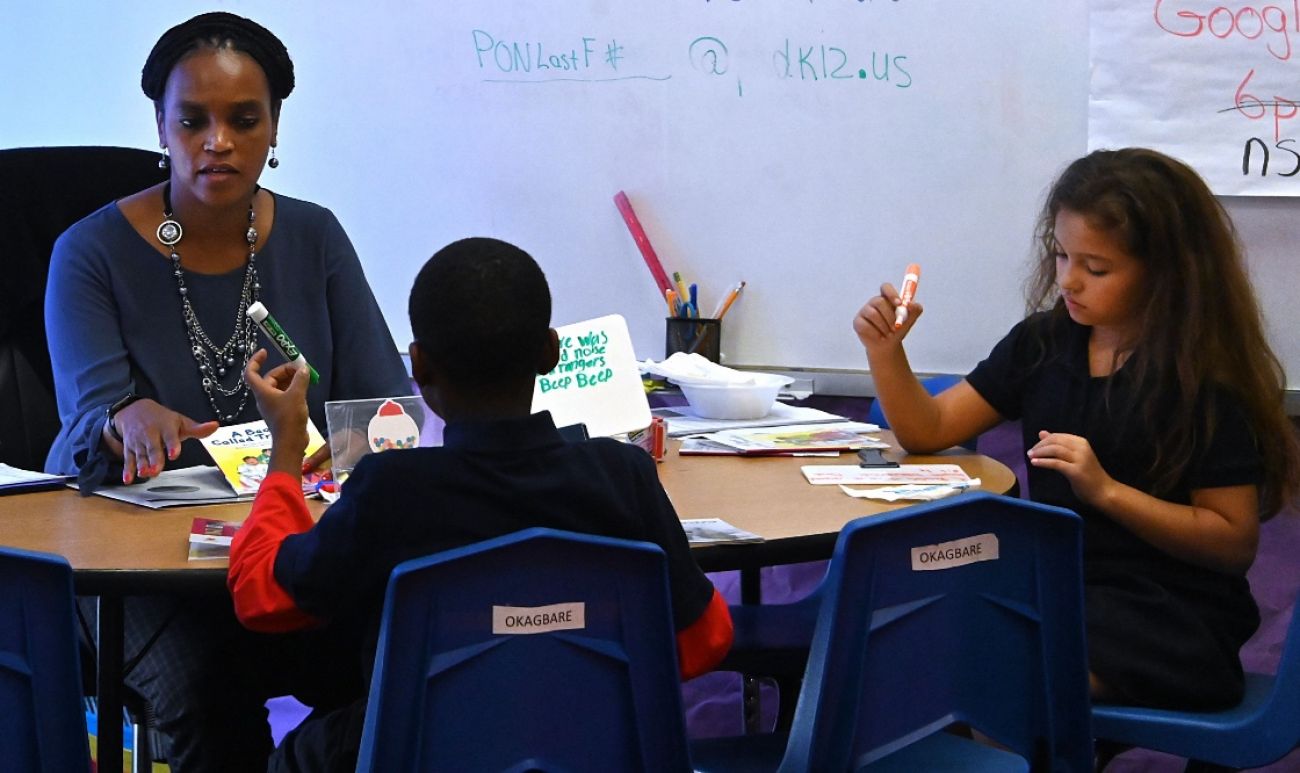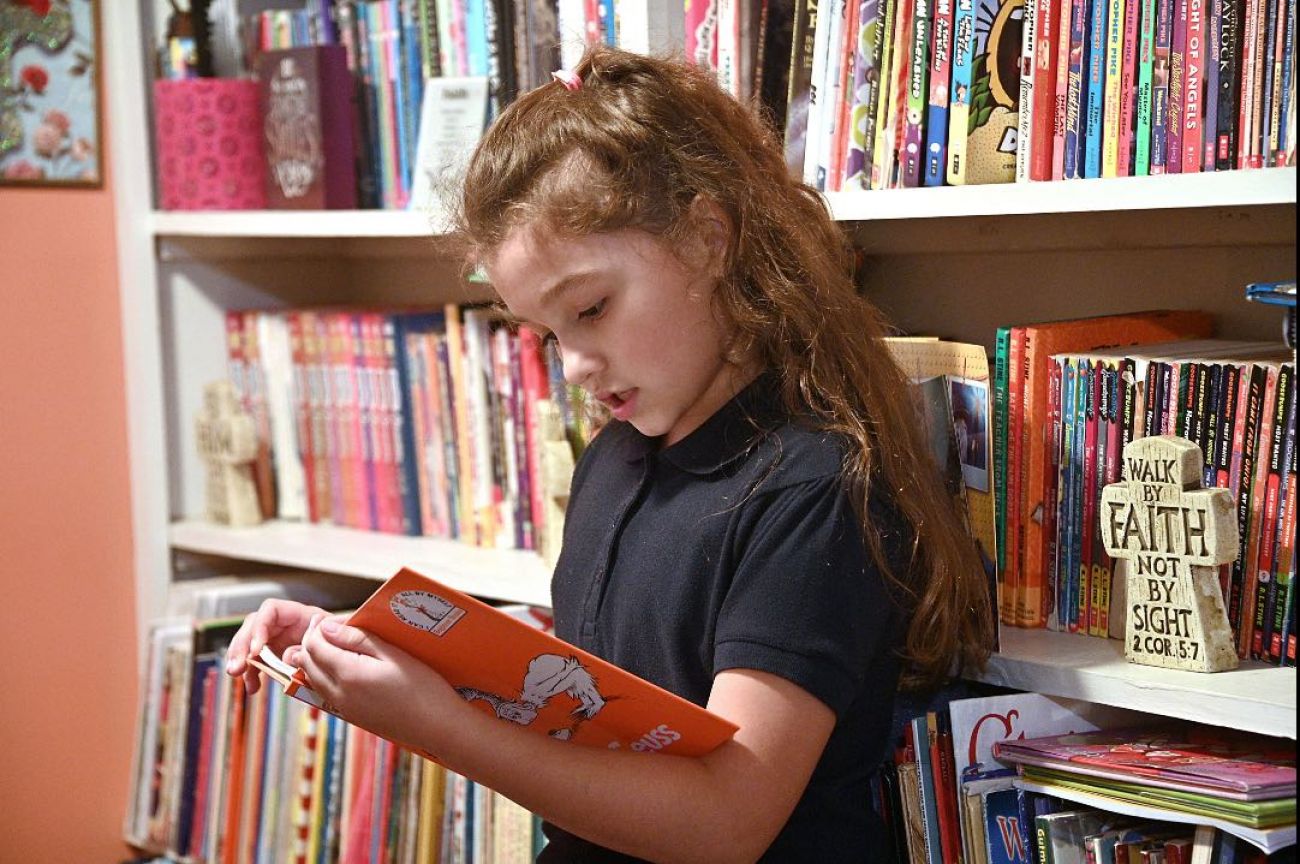After 3 years of substitute teachers, this Michigan girl may flunk 3rd grade

- Jan. 29, 2020: Gov. Whitmer launching effort to undercut Michigan’s third-grade reading law
- Dec. 18, 2019: Mike Shirkey: I’m open to changing Michigan’s third-grade reading law
PONTIAC – Sabrina leaned forward in a blue plastic chair. Beside her, Sabrina’s mother did the same. Mother and daughter sat with hands clasped, staring at a number on a computerized test report resting on a wood veneer desk.
Across from them, third-grade teacher Angela Okagbare used a pen to point at the number.
The number wasn’t a good number.
Sabrina had scored 188 on a standardized reading test in the first month of the school year. She needed to score 198 on that beginning-of-the-year test to be on pace to move on to fourth grade next year.
“Right now, she’s in danger of staying in third grade,” Okagbare told Sabrina and her mother, Heather Duenas.
Sabrina looked at her mom. “It’s OK,” Duenas said, smiling. “You can do it.”
Similar scenes likely played out this fall across Michigan at parent-teacher conferences, as schools and families navigate the first year in which third-graders risk flunking if their reading skills are more than a year behind.
Sabrina’s class in Pontiac is one of four third-grade classrooms that Bridge Magazine is following throughout the 2019-20 school year to chronicle the impact of the law on students, teachers and families.
The Michigan Department of Education projects that about 5,000 third-graders will be flagged for retention because of the new law, though there are exemptions that probably will allow some to advance to fourth grade despite low scores.
If Sabrina is one of them, her classroom experiences offer a likely explanation: three straight years of classes led by uncertified, long-term substitute teachers.
In kindergarten, Sabrina attended a Pontiac charter school where a certified teacher left after one semester because of health issues. In her second semester, a long-term substitute without a teaching certificate led the class.
Sabrina was behind in reading when she finished kindergarten, her mother told Bridge.

First grade was even worse. Sabrina’s teacher left for maternity leave after the fall semester. For the spring semester, the class was led by a series of substitutes, her mom said.
“She was getting further and further behind,” Duenas said. “I was trying to help her, but it’s difficult when you have four children and you’re working two jobs.”
In Michigan, long-term substitute teachers can lead classrooms for up to a full year, and are not required to have a college degree or any educational background. That’s a problem, given how closely tied student performance is to having quality teachers. A Bridge Magazine investigation in August found that the number of classrooms led by long-term subs grew 10-fold in five years, sparked by a teacher shortage in some parts of the state and in some academic teaching specialties.

Frustrated by her daughter’s experience in kindergarten and first grade, Duenas moved Sabrina to International Technology Academy, a school within the Pontiac public school district, for second grade.
“She had a good start, with a good teacher,” Duenas said. “And then on Christmas break, the teacher announced she wasn’t coming back.”
That left Sabrina with a series of long-term substitutes for three years in a row.
“Sabrina is strong-willed, and she didn’t get along well with a couple of the subs,” Duenas recalled. “I was in constant contact with [ITA principal] Mr. [Greg] Spencer, asking for a full-time teacher. Mr. Spencer said ‘I’m really trying.’”
Spencer confirmed to Bridge that Sabrina’s second-grade class had been led by subs for a semester last year. “It’s nearly impossible to find [a certified teacher] mid-year,” Spencer said. “Even if you can offer them more money [than they’re earning at their current school], they don’t want to leave the children they’re with already.”
Spencer said some long-term subs are excellent teachers who “are only missing certifications.” But Sabrina’s mother isn’t convinced.
“What happens a lot of times is they print off worksheets from a computer and say, ‘Do this, do that,’” Duenas said, “but they don’t have the training to know how to manage a classroom.”
Duenas said she sometimes wonders what Sabrina would be like today if she’d not had eight to 10 teachers in her first three years of school.
“She’s grown into thinking she can do whatever she wants,” Duenas said. “When you’re a sub, you’re not looked at as a teacher. The kids know. Sabrina had the outlook that, I don’t care, you’re not my real teacher.”
Third grade has been different. Sabrina loves Okagbare, her third-grade teacher, and Duenas says she can tell the 8-year-old is enjoying school more than in the past. Sabrina is one of a group of students the veteran teacher works with individually to try to improve their reading.
Okagbare uses Sabrina’s strong personality to encourage the 8-year-old to be a classroom leader. “That’s the kind of thing that comes with classroom experience,” Duenas said.

Still, it will be hard for the girl with the pink rainbow backpack who loves hip hop and quesadillas to catch up in reading skills with classmates who haven’t been hobbled by a series of uncertified teachers.
Bridge’s analysis of state data found that long-term substitutes are more common in urban and rural low-income schools – often in the same schools where students are most likely to struggle academically and need high-quality teachers.
Students who are poor readers in third grade struggle to catch up with their classmates, impacting rates of high school completion, college enrollment and future earnings. Holding children back until they read at grade level better prepares them for future success, argue proponents of the law. So too, raising the stakes for these students incentivizes schools and families to give extra attention to struggling third-grade readers so they can move on with their classmates, they say.
Educators generally disagree with the law, and studies have found that grade retention has negative academic effects.
If patterns of reading scores from past years on the M-STEP, Michigan’s standardized test, continue in 2020, more third-graders will flunk in low-income communities like Pontiac than elsewhere in Michigan.
Duenas works a full-time job with a community service organization in Pontiac, carries a full-time course load at Oakland University where she is studying to become a teacher, and cares for four children.

“I work with Sabrina on homework every night but it’s not always 100 percent, I’m not going to lie, because I have other things I have to do.”
At the conclusion of the parent-teacher conference, teacher Okagbare tried to prepare Sabrina and her mother for what could happen in May if her reading scores don’t improve. “In the spring, it’s up to you if you want her held back,” Okagbare told Duenas (the law allows parents to request their children move on to fourth grade). “But if she’s not at that [expected reading] level, I will highly recommend she stay.”
The law is the same for all students. Sabrina, who has never had a full year in a classroom with a certified teacher, is expected to meet the same reading score on a test as students whose academic lives have been less chaotic.
And though the state has spent at least $80 million on efforts to improve early literacy in response to the read-or-flunk law, none of that money has made its way to Okagbare’s classroom, the teacher said, despite there being at least four students who are in danger of being retained, including Sabrina.
“She’s finally at a point where she has an amazing teacher, but she’s had no base,” said Sabrina’s mom. “I’m sure that can happen any place, but I can’t imagine it happens as much” in more affluent communities.
Duenas said she sometimes comes home from work and finds Sabrina playing her favorite game of pretend, placing scraps of paper in rows on the floor, imagining those scraps are her students and she is the teacher.
Sabrina wants to be a teacher when she grows up, her mother said.
First, though, she has to pass third grade.
“She loves to read, but she doesn’t know how to do it very well,” Duenas said, as Sabrina sat quietly beside her, arms folded across a blue jean vest.
Duenas nudged her daughter and smiled. “But that’s OK. That’s OK.”
Michigan Education Watch
Michigan Education Watch is made possible by generous financial support from:
Subscribe to Michigan Education Watch
See what new members are saying about why they donated to Bridge Michigan:
- “In order for this information to be accurate and unbiased it must be underwritten by its readers, not by special interests.” - Larry S.
- “Not many other media sources report on the topics Bridge does.” - Susan B.
- “Your journalism is outstanding and rare these days.” - Mark S.
If you want to ensure the future of nonpartisan, nonprofit Michigan journalism, please become a member today. You, too, will be asked why you donated and maybe we'll feature your quote next time!






